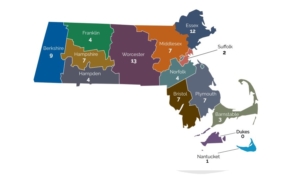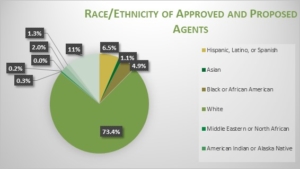News / First Year of Adult-Use Marijuana Retail Operations in Massachusetts Tallies $393.7 Million in Gross Sales, Sets Benchmarks for Growth
For Immediate Release
November 20, 2019
Contact
Cedric Sinclair
Director of Communications
857-268-6454
Maryalice Curley
Press Secretary
857-292-4891
Press@CCCMass.Com
First Year of Adult-Use Marijuana Retail Operations in Massachusetts Tallies $393.7 Million in Gross Sales, Sets Benchmarks for Growth
BOSTON—One year since Massachusetts became the first state to open adult-use Marijuana Retailers on the East Coast, licensees have generated $393.7 million in gross sales and established benchmarks that will enable the Commonwealth to measure its progress toward strengthening a safe, effective, and equitable legal cannabis industry, the Cannabis Control Commission (Commission) announced Wednesday.
“Marijuana Retailers and consumers should be commended for participating in an extremely smooth roll out of the legal adult-use cannabis industry in Massachusetts for the first year,” Commission Chairman Steven J. Hoffman said. “Hundreds of millions of dollars in sales are one measure of success, but I am even prouder of the way in which Marijuana Establishments have worked with the Commission to gain and preserve compliance with our regulations and patrons continue to inform themselves about the law and their responsibilities when they visit Massachusetts stores.”
“I am proud of the hard work done by the Commission team to get us here,” Commissioner Kay Doyle said. “I look forward to watching the industry continue to develop safely, equitably, and sustainably.”
“I am proud of the hard work that has been done to get us to this point,” Commissioner Jennifer Flanagan said. “Our agency has proven its commitment to address the public health and safety facets of marijuana legalization in Massachusetts through comprehensive regulations and the launch of the More About Marijuana public awareness campaign. I am confident that as the industry evolves, the Commission will uphold our mission statement to build a world class agency that honors the will of the voters and continue to address the public health and safety of all citizens.”
“The comprehensive regulations that the Commission adopted and that we’ve seen applied during the past year place a premium on public safety and public health,” Commissioner Britte McBride said. “As the industry grows and evolves in the Commonwealth a guiding principle of our work as a regulatory agency will continue to be safeguarding public safety and promoting responsibility in the industry and by consumers.”
“Over the past year, the Commission has been persistent in its efforts to set and implement nation-leading policies that support full participation in the adult-use cannabis marketplace by communities that have been harmed by the War on Drugs,” Commissioner Shaleen Title said. “I hope the voters who supported legalization in Massachusetts recognize the progress we are making and continue to work with us to achieve the industry they envisioned.”
Licensing, Sales, and Cultivation Data
Since the first two Marijuana Retailers commenced operations in Massachusetts last November, 33 total have opened statewide. Another 54 Retailers with provisional or final license approval are in the process of completing the Commission’s inspection and compliance procedures towards that end. In total, the Commission has licensed 227 Marijuana Establishments, including Cultivators, Product Manufacturers, Microbusinesses, and more. For updates regarding the Commission’s license and application data by license category, visit the Commission’s Open Data Platform.
The map below represents the total number of provisional licenses issued to Marijuana Retailers by county so far:

Retail Provisional License Map_November_7,_2019
The public may track weekly product sales as Marijuana Retailers begin operating across the state through the Open Data Platform.
Additionally, the Commission has approved 71 licenses for Cultivation, including five outdoor Cultivators, which are authorized to grow nearly 2.1 million square feet of canopy throughout the state. Of those, 21 licensees have commenced operations for adult-use cultivation. The Open Data Platform also enables the public to view plant activity by volume over the last year.
Priority licensing applications from Medical Marijuana Treatment Centers (MTC), formerly known as Registered Marijuana Dispensaries or “RMDs,” and Certified Economic Empowerment recipients are required by state law to be reviewed ahead of the general licensing queue on an alternating basis when they submit a completed licensing application to the Commission. To date, 164 priority MTC licenses have been issued out of 221 applicants that have applied; five priority Certified Economic Empowerment recipient licenses have been issued out of 21 applicants that have applied.
In September, the Commission also approved an expedition policy in order to prioritize the review of additional categories of completed license applications that further Commission objectives and mandates in state law, including applications from Independent Testing Laboratories, Social Equity Program participants, outdoor Cultivators, Craft Marijuana Cooperatives, Microbusinesses, and Women-, Minority-, and Veteran-Owned businesses.
Agents
As of November 7, across all categories of licenses, the adult-use cannabis industry in Massachusetts consists of more than 6,700 active Marijuana Establishment Agents. Of those, approximately 33 percent identify as female and 66 percent identify as male. Agent race and ethnicity breaks down as follows:

This fall, the Commission also launched training tracks for the nation’s first statewide Social Equity Program which is designed to lower barriers to the legal cannabis industry for individuals who have been disproportionately impacted by previous marijuana prohibition.
The majority of nearly 140 individuals who were certified for the program are currently participating in the Commission’s 14-course entrepreneur track through April. One Social Equity Program participant is currently operating a licensed retail Marijuana Establishment.
Courses for reentry and entry-level track participants also started this week. Training for participants in the core employment and ancillary business tracks begins this winter. More information about the Social Equity Program is available at MassCannabisControl.Com/EquityPrograms.
Public Health and Safety Initiatives
Over the first year of adult-use cannabis sales in Massachusetts, the Commission also led several health and safety initiatives as part of its ongoing to efforts to ensure responsible consumption.
The Commission disseminated a $2 million public awareness campaign, “More About Marijuana,” which highlighted important dialogue between parents and kids about the risks of underage consumption, and provided consumers information about compliance with adult-use cannabis laws and regulations in Massachusetts. The content was featured statewide on television, radio, website banners, social media, billboards, and transit. New content is available at a dedicated website, MoreAboutMJ.Org. A subsequent campaign phase will focus on the dangers of home manufacturing and cultivation.
In partnership with the Executive Office of Public Safety and Security, AAA, and the Commonwealth Dispensary Association, the Commission also supported the distribution of educational materials through licensed Marijuana Retailers and Medical Marijuana Treatment Centers this year. The content, which patients and consumers receive in bags of legally purchased products, focuses on the risks of impaired driving and encourages plans for alternative transportation or a designated driver when they anticipate consuming marijuana.
For more information, visit the Commission’s Open Data Platform and public awareness website, MoreAboutMJ.Org. The Commission is available to the public by email at CannabisCommission@Mass.Gov, by phone at 617-701-8400, and on Facebook and Twitter.
###
Get Notified
Subscribe for updates from the Cannabis Control Commission.

